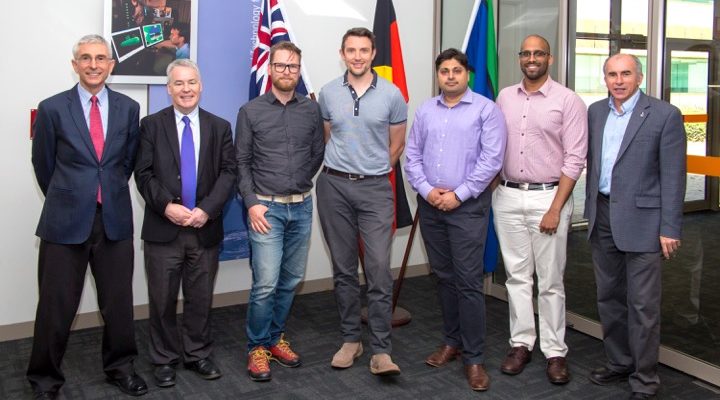Image: (L-R) Lead engineers of Cluster member companies with Dr Stephen Cimpoeru, Distinguished Professor Adrian Mouritz (left and second left) and Mr Murray Stimson, DST Group Aerospace Division (far right)
Advanced Fibre Cluster member lead engineers were given the inside scoop last month when Professor Adrian Mouritz delivered a DST Black Box Lecture in Melbourne detailing cutting edge techniques to tackle composite material cracking.
Entitled “Let’s Not Crack Up! Making Composites Highly Crack Resistant,” the presentation at the Department of Defence in Fisherman’s Bend was attended by representatives from the newly ASX-listed Carbon Revolution, Carbon Nexus, Advanced Composite Structures Australia, Sykes Racing Boats and Quickstep Technologies.
The fibre reinforced polymer composite materials market, projected to increase to nearly $200 billion within five years, is plagued by susceptibility to cracking and solving this problem has been a world-wide effort for decades.
Professor Mouritz, RMIT’s Executive Dean of Engineering and Distinguished Professor of Aerospace Materials, briefed attendees on strategies to mitigate the problem, exploring new techniques for the in-situ detection and self-healing of this delamination damage. He revealed innovative research performed at RMIT, including the use of nanoparticles, through-thickness fibres, and bio-inspired design to tackle the problem.
Professor Mouritz has conducted research into these materials for nearly thirty years, often in collaboration with industry or defence agencies, including Boeing, Airbus, Ford, United States Office of Naval Research and DST.]
The Defence Science and Technology research laboratory in Melbourne has just celebrated 80 years at its Fishermans Bend site, which known as the birthplace of the Black Box Flight recorder invented by David Warren in the 1950s.
Stephen Cimpoeru, Principal Scientist Land Division at DST, thanked Professor Mouritz for an outstanding lecture.
Dec 2019
